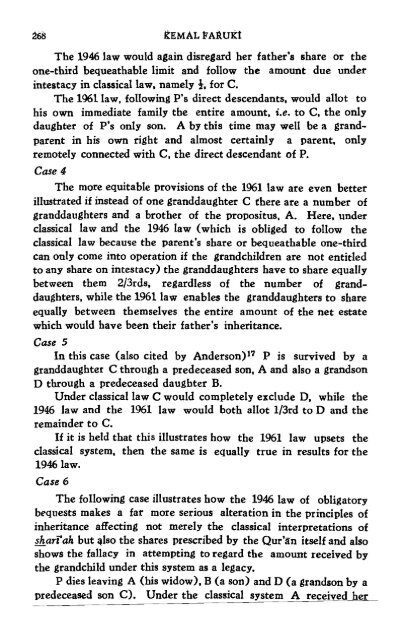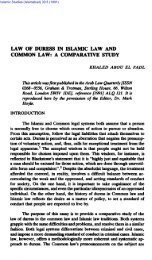ORPHANED GRANDCHILDREN IN ISLAMIC SUCCESSION LAW
ORPHANED GRANDCHILDREN IN ISLAMIC SUCCESSION LAW
ORPHANED GRANDCHILDREN IN ISLAMIC SUCCESSION LAW
Create successful ePaper yourself
Turn your PDF publications into a flip-book with our unique Google optimized e-Paper software.
The 1946 law would again disregard her father's share or the<br />
one-third bequeathable limit and follow the amount due under<br />
intestacy in classical law, namely 3, for C.<br />
The 1961 law, following P's direct descendants, would allot to<br />
his own immediate family the entire amount, i.e. to C, the only<br />
daughter of P's only son. A by this time may well be a grand-<br />
parent in his own right and almost certainly a parent, only<br />
remotely connected with C, the direct descendant of P.<br />
Case 4<br />
The more equitable provisions of the 1961 law are even better<br />
illustrated if instead of one granddaughter C here are a number of<br />
granddaughters and a brother of the propositus, A. Here, under<br />
classical law and the 1946 law (which is obliged to follow the<br />
classical law because the parent's share or bequeathable one-third<br />
can only come into operation if the grandchildren are not entitled<br />
to any share on intestacy) the granddaughters have to share equally<br />
between them 2/3rds, regardless of the number of grand-<br />
daughters, while the 1961 law enables the granddaughters to share<br />
equally between themselves the entire amount of the net estate<br />
which would have been their father's inheritance.<br />
Case 5<br />
In this case (also cited by Anderson)17 P is survived by a<br />
granddaughter C through a predeceased son, A and also a grandson<br />
D through a predeceased daughter B.<br />
Under classical law C would completely exclude Dl while the<br />
1946 law and the 1961 law would both allot ll3rd to D and the<br />
remainder to C.<br />
If it is held that this illustrates how the 1961 law upsets the<br />
classical system, then the same is equally true in results for the<br />
1946 law.<br />
Case 6<br />
The foIlowing case illustrates how the 1946 law of obligatory<br />
bequests makes a far more serious alteration in the principles of<br />
inheritance affecting not merely the classical interpretations of<br />
-<br />
shari'ah but qlso the shares prescribed by the Qur'sn itself and also<br />
shows the fallacy in attempting to regard the amount received by<br />
the grandchild under this system as a legacy.<br />
P dies leaving A (his widow), B (a son) and D (a grandson by a<br />
predeceased son C). Under the classical system A received her
















